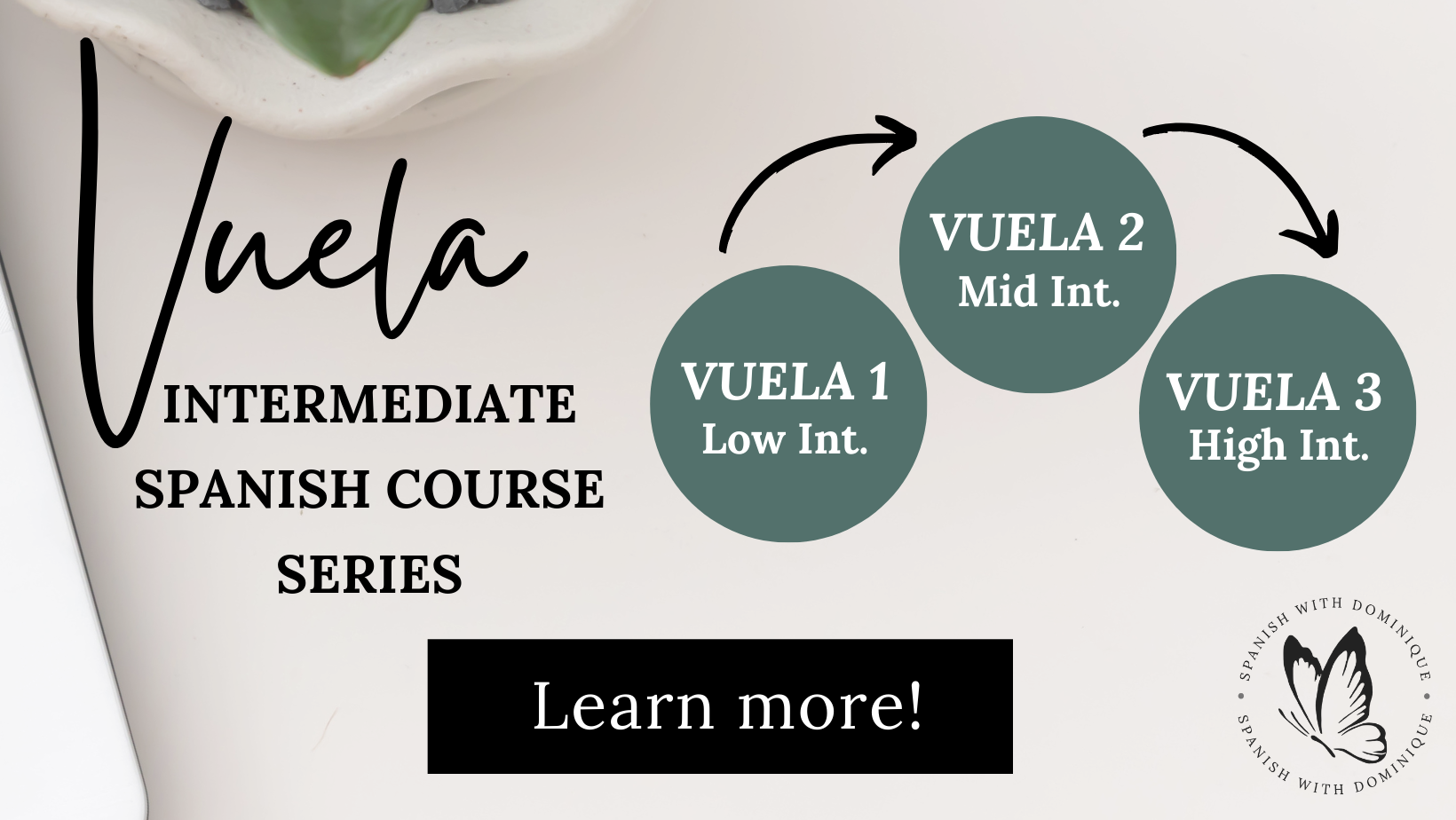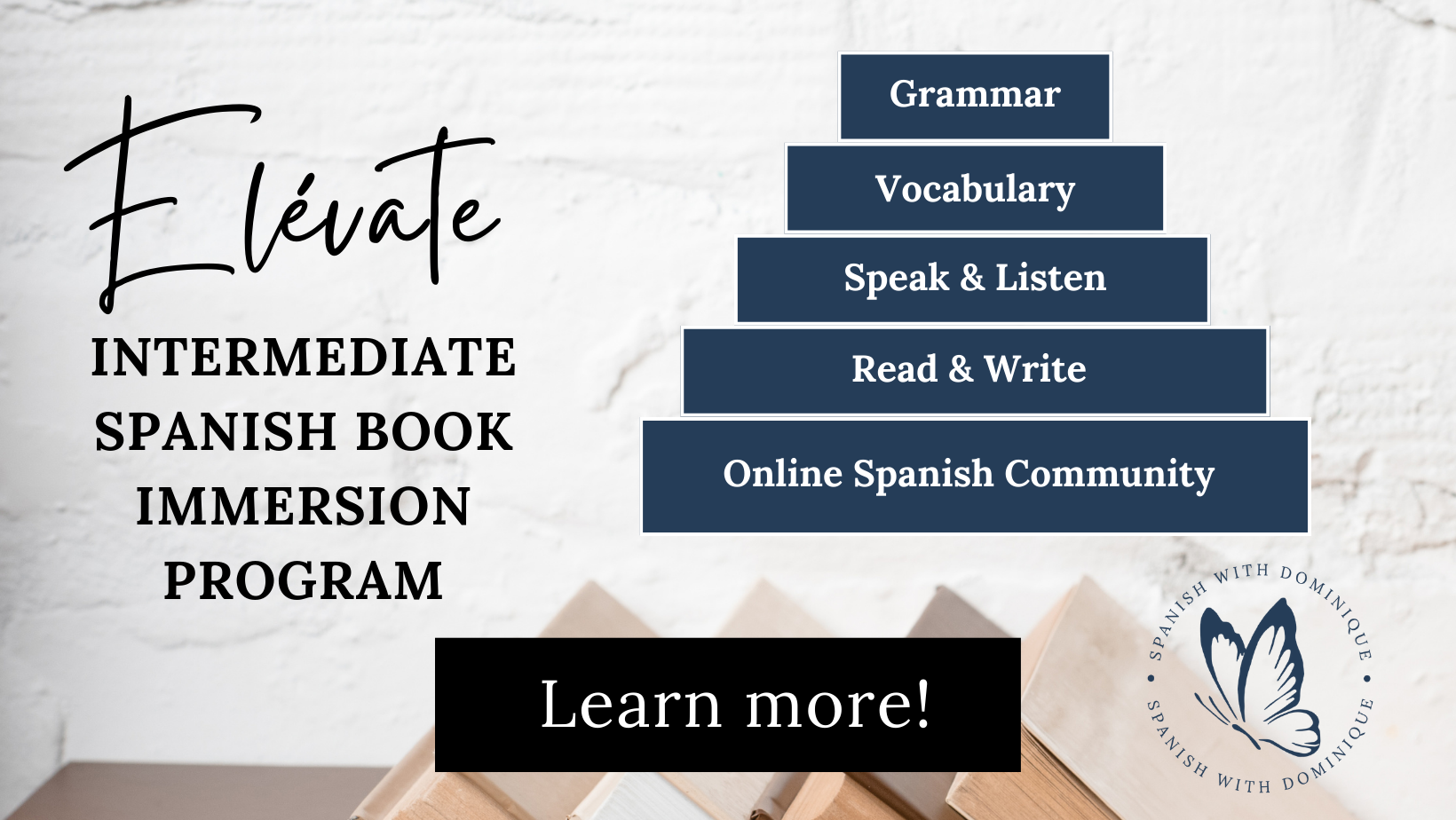Spanish Conversation Practice Opportunities in Your Community
In this post: This is your comprehensive guide to finding Spanish conversation practice near you. Practice speaking Spanish in your community and boost your fluency.
Are you dreaming of fluent Spanish conversations but struggling to push yourself to a more advanced level? Then you’re in luck: opportunities to practice Spanish in authentic and engaging situations are closer than you think, especially if you live in the U.S., where Spanish is the most spoken language after English.
Learning Spanish as an adult is not something you can do on your own. You need engagement, interaction, and real-world Spanish conversation practice. In other words, you need to step out into your community.
In the U.S., there are tons of opportunities to put yourself in situations where you’ll be forced to use Spanish (hey, sometimes we need a little nudge!)
But tapping into the powerful benefits of immersing yourself in Spanish conversations won't just happen magically—you have to be proactive and seek out those opportunities and environments.
When I returned to Sacramento after studying abroad in Barcelona for a year, I was worried. I knew that if I didn't actively use the language, I was going to lose all those gains in my conversational skills. And I had worked hard to become conversational in Spanish!
So, I looked for ways to be exposed to Spanish every day--in my community. I started taking classes at a Spanish language school, but when I had the opportunity to take a part-time front desk job at the school, I took it. That ultimately led to a full-time job running the ESL department!
I took on another part-time job working the registers at a distribution center for landscaping supplies. Was the job glamorous? No. Did I have an interest in or knowledge of fertilizers and sprinklers? Not so much. But, I was motivated to take that job because I knew I would hear and speak Spanish there every day. Not classroom Spanish, but authentic slang--a whole new world to me.
I even joined a Spanish Toastmasters group where Spanish-speaking business professionals give public presentations as a way to build their public speaking skills. Imagine getting up in front of native speakers and giving a talk... nerve-wracking. But you know what? I grew a lot in my Spanish over those months just by putting myself in this challenging environment.
Once you start brainstorming, you might be surprised at how accessible Spanish practice can be. It’s like every experience, no matter how simple or humble, leads to another tie to the Spanish-speaking community.
Each time you seek out an opportunity, you’ll create several others for yourself. (You can do it even if you’re a little scared. Feeling nervous does NOT mean you’re not improving!). And remember, connecting your Spanish-speaking practice to real-life experiences is an incredibly effective way to learn--so it’s definitely worth the effort.
So what will you do next? From joining a local Spanish book club to volunteering in your own community, there are myriad of ways to immerse yourself in Spanish conversations. All you need are a few ideas to get you started, a touch of enthusiasm, and a willingness to step out of your comfort zone.
That’s why I’ve created this comprehensive guide to Spanish conversation practice opportunities you can find locally. Ready to explore? Read on.
While reading this post, consider these questions:
Do you have any interests, sports, or hobbies you could combine with Spanish for more fun and Spanish-speaking practice?
Are there neighborhoods or travel destinations near you where you could spend a day and speak Spanish?
Have you ever thought of connecting to your community through volunteer work? Are there organizations where your Spanish could come in handy?
Immersing Yourself Locally: Where Can I Practice Speaking Spanish?
Explore Latino Neighborhoods
You can find Latino neighborhoods in most cities and even smaller towns across the U.S. Looking for examples? Think of East LA, Pilsen in Chicago, Little Havana in Miami, and El Barrio (Spanish Harlem) in New York City. These are great places to hear and practice Latin American and Mexican dialects of Spanish.
Stop by a Latino Grocery Store for a Slice of Culture and Language
Mexican shops will probably be the easiest to find but do a bit more searching, and you could find a little Salvadoearn or Cuban spot with all your favorite goodies from the country. Make sure to address the people there in Spanish -- they’ll be impressed that you’re learning Spanish.
Visit Farmer’s Markets and Talk with the Farmers and Vendors
For great food, local produce, and a chance to interact with Spanish speakers, talk with the business owners at the local farmers' markets. They will be very eager to tell you about their produce and growing process - and probably even their family, too! (I always have the BEST Spanish conversations at Farmer's Markets).
Check out Spiritual, Cultural, and Community Centers
Attend Sunday Mass at a Local Catholic Church
Many churches offer services in Spanish. Even if you're not religious, community events associated with these churches can be warm and welcoming.
Stop by a Local Latino Festival and Celebrate Language and Heritage
There might be a fiesta in your backyard just waiting for you to discover. Many cities hold festivals celebrating Latino culture. These can be general or country-specific, like Mexican Independence Day celebrations or Puerto Rican-inspired parades.
Hang out in the Spanish Section at Your Local Library
You may be wondering if you should try the adult section or the kid’s section. And the answer? Both! You’re bound to hear or run into children and parents speaking Spanish. You could volunteer to read books to children. Hey, maybe you’ll make a friend, and they’ll invite you over for dinner. You never know!
Consider Dance and Sports for Spanish-Speaking Practice
Get Moving at a Latin Dance Studio
Have a blast learning dance styles like salsa, bachata, and merengue, which often have associated social nights. This is especially for you if your Spanish learning style means you like to move while you learn. What better way to practice conversational Spanish than while catching your breath between songs?
Check Out a Cultural Hobby Group
Boost your Spanish practice with interest-based learning while you engage in hobbies popular in Spanish-speaking countries. You could try playing soccer, learning traditional dances, or even playing dominos in parks, as many do in places like New York's Little Havana.
Practice Speaking Spanish through Educational Opportunities and Social Interaction
Join a Spanish Meetup, Socialize, and Learn
Imagine this: you step into a locally-owned coffee shop, and the smell of freshly brewed café, chat with a group of Spanish learners and native speakers from your community. People bring flashcards, travel photos, or even Spanish-language children’s books to get the conversation rolling.
If that sounds good to you, know that there are many Spanish conversation groups and Spanish-speaking meetups to discover in the US. Just check out Meetup.com.
And if you’re feeling nervous about getting started with conversation practice in Spanish, you may find that a warm meeting where everyone is there to learn is just the place to feel comfortable.
Community Spanish Classes: Formal Yet Friendly
Community classes tend to be more relaxed and community-oriented than many traditional classes. Plus, they often host immersion events and can be a great place to meet other Spanish learners and find even more opportunities. But you won’t find out until you take the first step.
Engage with the Spanish-speaking Community through Work and Volunteer Opportunities
Take on a Part-Time Job with a Linguistic Twist
Seek out a part-time job where you’ll regularly interact with the Spanish-speaking community.
That might mean working as a receptionist or a substitute teacher at a local bilingual elementary school or working in after-school programs in Spanish-speaking communities. The point is to be creative and see what’s going on around you.
Try out Volunteering: It’s a Two-Way Street of Learning and Helping
Look for opportunities to work or volunteer in organizations serving the Spanish-speaking community. This could be in community centers, immigration services, or charity events.
Where Can I Learn to Speak Spanish in My Community? With Theater and Local Television Channels
Take in a Spanish Play or Movie for a fun Night Out and a Little Culture
Imagine a Friday evening under the street lights, as you wander towards the facade of a historic local theater. No Hollywood films for you tonight. The marquee above you reads Festival de Cine Latino—or perhaps, Los Vendidos ("The Sellouts") by Luis Valdez - a Chicano play from the US that dives into stereotypes and challenges confronting Mexican Americans.
Many cities have theaters that play Spanish-language films or hold Spanish-language plays. What’s showing near you?
Tune in to Local Spanish Television
If you just want to have a lazy night at home, flip to the local Spanish-television stations like Telemundo or Univision. There’s bound to be a good telenovela on! And if you can’t find anything locally that you’re interested in watching, you can always turn on a Spanish Netflix series, listen to a local Spanish radio station, or tap into an authentic Spanish podcast.
Looking for More Creative Ideas for Spanish Conversation Practice?
Try a Spanish "Staycation" or a Mini-Immersion Experience
Wondering how to do this at home? Have fun spending a weekend living as if you're in a Spanish-speaking country. Only eat Latino food, watch Spanish shows, listen to Spanish music, and only speak in Spanish.
Travel Locally to a Spanish-Speaking Destination Near You
Visit places within the U.S. with a high concentration of Spanish speakers. This doesn't mean international travel – a weekend trip to a predominantly Spanish-speaking area can be a mini-immersion experience.
Taste While You Talk with Cultural Cuisine Nights
Once a week, cook a dish from a different Spanish-speaking country. Research its origins, learn the vocabulary related to the ingredients, and, if possible, watch a Spanish-speaking video or read a recipe in Spanish to make it. Invite some friends over to share the experience with you.
Host Your Own Cultural Celebrations
If you have space and the inclination, host celebrations for events like the Day of the Dead (Día de los Muertos), Three Kings Day (Día de los Reyes), or other regional festivals.
Mix Things Up: Practice Speaking Spanish and Play Music
Sing Your Way to Better Spanish with Spanish Karaoke Nights
Organize or attend karaoke nights where the focus is on Spanish songs. It's a fun way to improve pronunciation and rhythm. And in case you’re not convinced singing can help you learn Spanish? Check out the story of how Selena Quintanilla learned Spanish as an adult.
Take Music Lessons and Practice Spanish while You Play
Learn instruments popular in Latino music, like the guitar, maracas, or even the Spanish cajon. If you get good at it, you could find a local band to play in who will most definitely play Latin tunes for Spanish-speaking audiences.
How to Practice Speaking Spanish with Unique Local Activities and Clubs
Join a Cooking Class in Spanish
Find local cooking classes that focus on Latin cuisines.
Cooking is a language of its own, and you'll likely find Spanish speakers passionate about their native dishes. Who knows, you may come away with the secret to the best tamale sauce and realize you’ve practiced asking great questions in Spanish--all in one evening.
Join or Start a Spanish Club
Whether it's a book club, a film club, or just a discussion group, having regular meetups centered around the Spanish language can be a big help. This is something I know from experience!
I wanted to continue reading novels in Spanish, but there wasn’t a local Spanish language book club - so I created one at our local Spanish school.
I ran the club a couple of times a year, and at one point, we even held group sessions in my living room! We read books like Cien Años de Soledad and La Casa de Espiritus. These are books I might have found challenging to read alone, but the conversation and community helped us take on challenges we never dreamed possible.
Look for Spanish Toastmasters Groups in your Neighborhood
Toastmasters is a place where professionals in the community come together to hear, prepare, and deliver speeches in order to improve their public speaking skills. Some cities have Toastmasters but in Spanish! Here is an example of a local Spanish chapter in Sacramento.
Takeaways:
If there's one thing I've learned as an adult learning Spanish, it’s this: every opportunity to connect with Spanish creates more opportunities.
Whether it's taking a part-time job at a landscaping supply center or giving a speech in Spanish at a Toastmasters meeting. Each exciting new challenge you undertake is a step towards the next.
As someone who's spent plenty of time reaching out to my local Spanish-speaking community, I want you to remember one thing:
Feeling nervous doesn't mean you're not improving. And it doesn’t mean you’re not in the right place.
In fact, those times when I noticed a real improvement in my Spanish conversation skills happened when I had been spending more time out of my comfort zone.
Whether you’re giving a presentation in front of Spanish speakers or volunteering at a community center, the point is to expose yourself to real-world Spanish--not to speak perfectly.
You're just one conversation away from a whole community of Spanish-speaking experiences. So what will your first step be?







